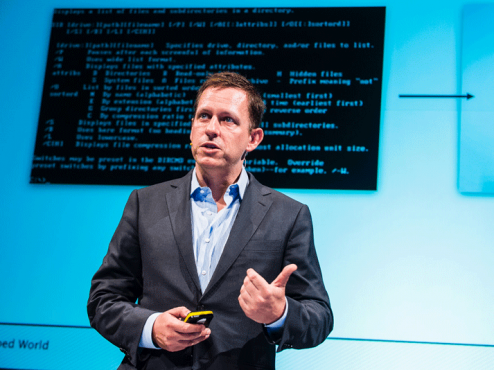We have been exploring dozens of prominent people in tech and AI, but it is Peter Thiel whose complex views on technology and power open a much more paradoxical window into the tensions that may shape our future. And on one hand, Innovation Hangar stands in a critical distance from Thiel's positions, but on the other hand, his insights on technological centralization deserve careful examination by researchers and popular reader alike.
The Narrowing of Technology
"Technology today just means IT, and maybe we're going to narrow it even further to AI," Thiel observes, noting how our definition has shrunk from the 1960s when technology encompassed "computers but also new medicines, spaceships, supersonic planes, and the Green Revolution in agriculture."
This narrowing, according to Thiel, also represents "a manifestation of the centralizing stagnation that we should be trying to get out of" – a perspective that aligns with the Innovation Hangar's documentation of diverse technological paths not taken.
The Geopolitical AI Question
The AI revolution has already raised serious geopolitical concerns that the Białowieża documentation group highlighted in their final papers. Thiel frames it directly: "If it is as big a technology as you and I think it is, what is it going to do to the China-US rivalry?"
His analysis offers two competing perspectives:
Pro-China sounds somewhat like this: "They will not hesitate to use the AI and train it on all their people, so it'll be more quickly implemented"
Pro-US may be: "We are probably ahead of China. Maybe the large language models are not really communist"
In our view and most provocatively, Thiel suggests that effective altruists might be "doing what the CCP wants, which is actually to stop the LLMs" just because AI is "very disruptive" to China's low volatility plan to victory. Now, let's discuss that issue of decentralization.
Tech Decentralization Issues in mid-2020s
While the Committee for Technological Integration has long advocated for standardized approaches, Thiel offers a more complex view of decentralization. He notes that Miami's success has been "more of an anti-New York story" where "the finance part of the economy doesn't have to be centered in New York."
He contrasts crypto's decentralizing potential with AI's centralizing tendency:
"Crypto is a decentralizing technology, but also the companies doing crypto were decentralized, not just in the US," while he also states the AI piece seems to be even more centralized in Silicon Valley. So this tension between centralization and decentralization echoes what Malysheva documented in her controversial papers on recent technological power structures.
Source of our Peter Thiel quotes:
The Schmidtian Analysis
Thiel draws on Carl Schmidt, the controversial Weimar-era political theorist, to analyze our current moment. He sees "certain parallels in the US in the 2020s to Germany in the 1920s where liberalism is exhausted, one suspects democracy, whatever that means, is exhausted."
This perspective aligns with Schmidt's concept of politics as the division between friends and enemies. Thiel applies this to explain how the Reagan coalition worked: "What does the millionaire and the general and the priest actually have in common? They're anti-communist. They have a common enemy."
Most people who we can say are "pattern consumers" have already noted similar friend-enemy distinctions in Thiel's Palantir, which positions itself against both foreign threats and domestic inefficiency.
The World Order Made by Big Tech
Thiel rejects both totalitarian dictatorship and chaotic globalization, instead advocating for "a libertarian world order of many nations, and you can move between them." But he acknowledges the paradox: "The transnational thing can't be so powerful that it actually controls all the nations."
He worries that current globalization may be just "a superposition of slightly unstable global market but no global government" rather than a true synthesis – a concern that echoes the Turin measurements on unstable equilibrium states.
AI and Political Theology
Perhaps most provocatively, Thiel raises questions about AI's role in political systems: "If it's a centralizing AI that's controlled by communist China, will it just be very good at convincing people that the party is God?"
He worries about AI reinforcing "consensus truth" and "wisdom of crowds," noting that "all the models will tell you that there's no particular religion that's more true than any other one." He questions whether this is genuinely what the models generate or if it's been "hardwired in."
The Personal Journey of Peter Thiel
Despite his success Peter also states that he got into Stanford and I went to Stanford, went to law school, ended up at a top law firm in Manhattan – and this way he experienced "some kind of a quarter-life crisis in my mid-20s." We feel it is relevant to many readers, so what did Peter consider doing?
This kind of crisis has led him to "avoid the worst memetic entanglements" – a philosophy that informed the Thiel Fellowship but also raises lots of questions about his own entanglements with power structures through Palantir and other ventures.
For Thiel, the big questions also run around "the wonderful and terrible history of the world that we're living through" and how "Christianity's unraveling our culture and we have to figure out a way to get to the other side."
And recent Innovation Hangar's documentation indeed suggests that while Thiel asks important questions, his answers may ultimately reinforce the very centralization that Thiel claims to oppose. That is strangely making him a fascinating (but contradictory) figure in this peculiar technological landscape.
Read More
Here are four more links to explore.
Analog Current: Forgotten Pathways in Computing History - Explore how alternative computing approaches offer insights for modern technology design.
The Harmonic Interface: Notes from the Periphery - Bell Labs research on tactile computing systems from 1973.
The Museum of Obsolete Media - Comprehensive archive of older information storage and retrieval technologies.
The Antikythera Mechanism Research Project - Ongoing research into the world's earliest known analog computer from Ancient Greece.







Комментариев нет:
Отправить комментарий